
Top 10 vial filling machine manufacturers In The World(2024)

V Blenders Guide: Working Principle, Types, Advantage and Tips for Success
What’s the Difference Between Hard Gelatin Capsules and Soft Gelatin Capsules?
Looking to learn the differences between hard and soft gelatin capsules and which can benefit your business the best? Capsules play an important role in delivering medications in the pharmaceutical industry. That said, there are two main types of capsules: hard gelatin capsules and soft gelatin capsules. While they might seem similar, they serve different purposes and are used for various reasons.
In this article, we’ll explain the differences between these two types of capsules, along with their advantages and disadvantages. Let’s get right into it…
Capsules Overview
Before we dive into a breakdown of the two, let’s do a quick overview. Capsules are a widely used method of delivering medicine and supplements, favoured for their simplicity, simplified administration, and capacity to contain a diverse array of substances.
By offering an alternative to traditional pills and liquids, these products help patients swallow and take necessary amounts more easily. In general, capsules are available in two forms: hard gelatin and soft gelatin, each with distinct characteristics, uses, and production methods.
What Are Hard Gelatin Capsules?
To put it simply, hard gelatin capsules, also known as "two-piece" capsules, are composite structures comprising a cap and a body. Each of these components is loaded with powdered or granulated materials. That said, the capsules are composed of gelatin obtained from collagen. These capsules are specifically formulated to break down quickly in the stomach, therefore releasing the contained components for proper absorption.

Hard Capsules
What Are Hard Gelatin Capsules Used For?
Hard gelatin capsules are mainly used for solid forms of medicine, like powders, pellets, and granules. These capsules offer great versatility in terms of filling choices and are suitable for semi-solids, suspensions, and even certain liquids as well. These capsules have extensive application in the fields of medicines, nutritional supplements, and nutraceuticals owing to their high compatibility with certain compounds.
How to Make Hard Gelatin Capsules
Hard gelatin capsules are made using a simple procedure that guarantees filling accuracy and uniformity. Put simply, they are made in three steps:
Step #1: Preparing the Gelatin Solution
The process starts with the preparation of a gelatin solution. Gelatin is mixed with water and plasticizers like glycerin or sorbitol to make a thick, sticky liquid. To achieve uniform consistency and avoid clumping, the mixture is heated and agitated. At this point, colorants and preservatives may also be used to augment the visual appeal of the capsules. The plasticizers provide the gelatin with the necessary flexibility to undergo capsule formation.

Filling gelatin solution-Grand Liquid Capsule Filling Machines
Step #2: Dipping Molds
The capsule-shaped molds are immersed into the gelatin-based solution. The molds are then rotated and dried to form a solid, even coating around the pins, creating both the capsule body and cap. This step involves meticulous management of the thickness of the gelatin coating to guarantee consistency in both size and strength.

Cured hard gelatin capsules
Step #3: Joining and Filling
Following the drying process, the gelatin halves are extracted from the molds. Subsequently, the capsule body is filled with the selected substance, which may be powder, granules, or pellets. Following the filling process, the cap is placed on top of the body, thereby sealing the contents. In order to guarantee resistance to tampering, the two parts are frequently locked or sealed for extra security.

Finished hard gelatin capsules
What Are the Advantages of Hard Gelatin Capsules?
Hard gelatin capsules have several advantages that render them well-suited for wide range of pharmaceutical applications, such as:
- Versatility: These capsules can accommodate a wide range of fill materials.
- Rapid Dissolution: These types of capsules disintegrate quickly in the stomach, allowing fast absorption.
- Tamper-Evident: These capsules are designed to show tampering, making them a safe option for medications.
- Customizable Sizes: These types of capsules are available in different sizes to accommodate varying doses.
- Ease of Manufacturing: These types of capsules have a simple manufacturing process compared to tablets.
What Are the Disadvantages of Hard Gelatin Capsules?
Although hard gelatin capsules have certain benefits, they also have specific disadvantages:
- Moisture Sensitivity: Gelatin can absorb moisture, which may affect the stability of the capsule's contents.
- Not Suitable for All Liquids: While they can hold some liquids, hard gelatin capsules are not ideal for oily or hydrophilic liquids.
- Animal-Based: As gelatin is derived from animals, these capsules are not suitable for vegetarians or vegans unless plant-based alternatives are used in the manufacturing process.
What Are Soft Gelatin Capsules?
Now let’s take a look at the second option, soft gelatin capsules, or softgels, which are single-piece capsules commonly employed for encapsulating liquids, oils, or active components that are dissolved in a liquid matrix.
Their composition consists of a gelatin shell that is both more pliable and thicker than the one employed for hard capsules. Softgels are commonly employed for pharmaceuticals that exhibit sensitivity to moisture or require administration in a liquid state to enhance absorption rate.If you happen to be a manufacturer, you can try to choose Grand softgel capsule making machine.
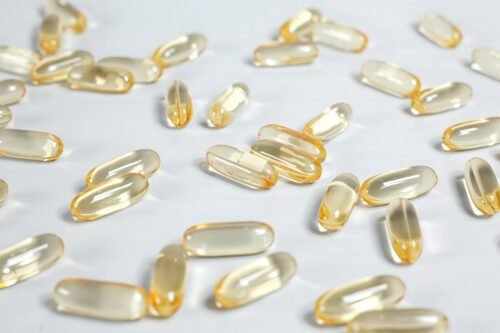
Soft Gelatin Capsules(fish oil supplements)
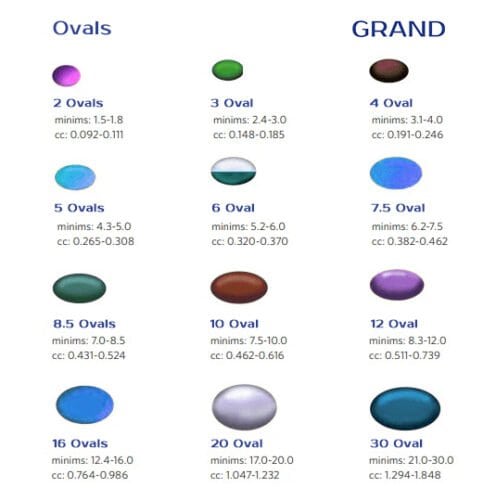
oval softgels size chart-grand
What Are Soft Gelatin Capsules Used For?
Soft gelatin capsules are extensively utilized in the pharmaceutical and nutraceutical industries to provide liquid-based compositions. Specifically, they are very efficient at encapsulating oils, vitamins such as Vitamin D and E, and some hydrophobic medications. Softgels are also highly used in dietary supplements when accurate amounts of liquid components are necessary.
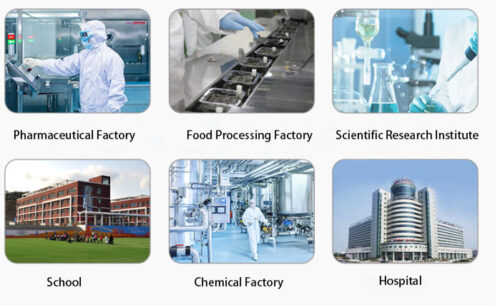
How to Make Soft Gelatin Capsules
Compared to hard gelatin capsules, the manufacturing of soft gelatin capsules is more intricate and involves the following steps:
Step #1: Preparing the Gelatin Mixture
The first step involves the preparation of the gelatin mixture by the combination of gelatin, water, plasticizers (such as glycerin or sorbitol), and occasionally colorants or preservatives. To guarantee uniformity and get the necessary elasticity and flexibility, this mixture is heated and combined. The plasticizers facilitate the softening of the gelatin shell, therefore rendering it flexible for encapsulation.
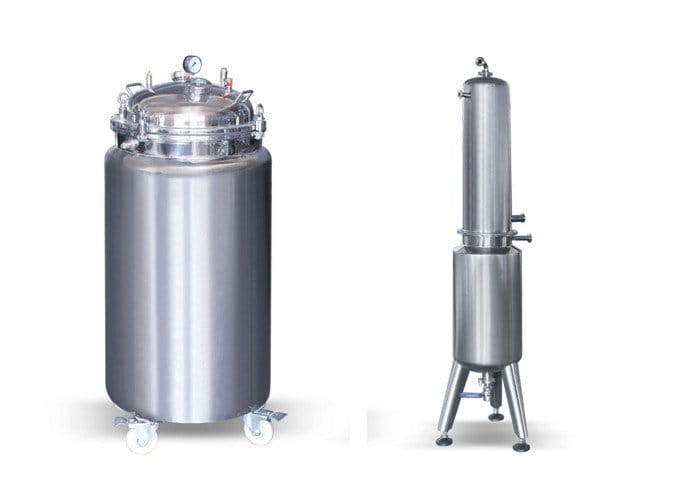
Soft Gelatin Mixture Machine
Step #2: Encapsulation
Once the gelatin mixture is prepared, it solidifies into a thin layer. A liquid or semi-solid fill ingredient is introduced into the space between two layers of the gelatin film. The capsule is then sealed, thereby guaranteeing the absence of any holes or leaks. This step often involves rotary die encapsulation, a specialized machine that fills and seals the capsules simultaneously, forming the softgel in a single motion.
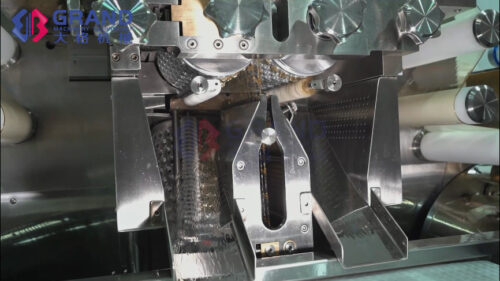
Soft Capsule Forming Machine
Step #3: Drying and Examination
Following the sealing process, the capsules undergo drying to decrease their moisture content and enable the solidification of the outer shell. Proper drying is essential for preserving the stability and longevity of the softgels. Following the drying process, the capsules undergo a thorough examination to assess their consistency, structural soundness, and any flaws, such as leaks or variations in size, prior to being prepared for distribution.
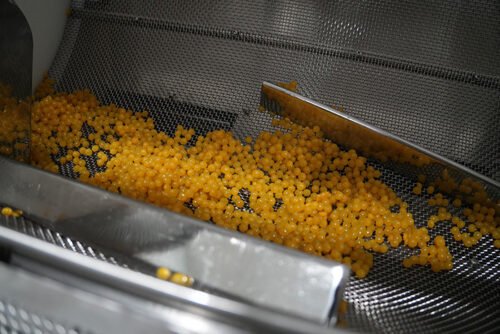
Soft gelatin capsules waiting to be dried
What Are the Advantages of Soft Gelatin Capsules?
Soft gelatin capsules offer the following main advantages:
- Ideal for Liquid Formulations: These types of capsules are perfect for encapsulating liquids, oils, and active ingredients in liquid form.
- Improved Bioavailability: The liquids within the capsule may enhance the absorption of certain drugs or prescriptions.
- Easy to Swallow: These types of capsules have a smooth and flexible texture that makes them easier to swallow for users.
- Protection from Oxidation: These capsules offer excellent protection for ingredients sensitive to oxygen and moisture.
What Are the Disadvantages of Soft Gelatin Capsules?
Now on the other hand soft gelatin capsules, however, have a few disadvantages, such as:
- Complex Manufacturing: These capsules require specialized machinery and processes, making it more expensive.
- Stability Issues: The capsules can be sensitive to temperature and humidity, affecting the integrity of the capsule.
- Limited Applications: These capsules are primarily used for liquid formulations, limiting its versatility compared to hard capsules.
- Slower Dissolution: The thicker gelatin shell on these capsules may take longer to break down in the digestive system, delaying the release of the active ingredient in the body.
What Is the Difference Between Hard and Soft Gelatin Capsules?
As a general overview, the primary differences between soft and hard gelatin capsules are found in their use, material, and construction.
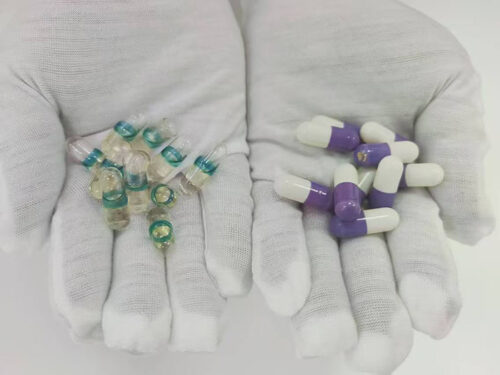
To put it simply, hard gelatin capsules which are mostly used for powdered or solid formulations, are made up of a body and a cap. Because of these capsules' flexibility, the pharmaceutical and nutraceutical sectors employ them extensively. In general, their production method is more economical than that of soft capsules, and they are simpler to make and fill with dry materials. Hard gelatin capsules also break down rapidly in the stomach, facilitating quicker absorption of the contents.
Soft gelatin capsules, on the other hand, are commonly used to encapsulate liquids, oils, or semi-solids. The gelatin shell of softgels is thicker and more flexible than that of hard capsules. These are a good option for medications that must be administered in a liquid form especially for those that must have increased bioavailability or are sensitive to moisture.
In summary, hard gelatin capsules are best suited for solid substances and easier to manufacture, while soft gelatin capsules are ideal for liquid formulations but require a more intricate production process. All that being said, both forms have their unique benefits, depending on the intended use.
Find the Best Capsule Options for Your Business at Grand
Do you want to modernize your capsules to better meet the demands of your business? At Grand we offer a range of alternatives that are customized to meet your unique needs. Whether you want soft gelatin capsules for liquid formulations or hard gelatin capsules for powdered pharmaceuticals, we provide cutting-edge equipment and knowledgeable assistance to help you quickly make high-quality capsules. Give us a call or fill out a contact form to learn more.


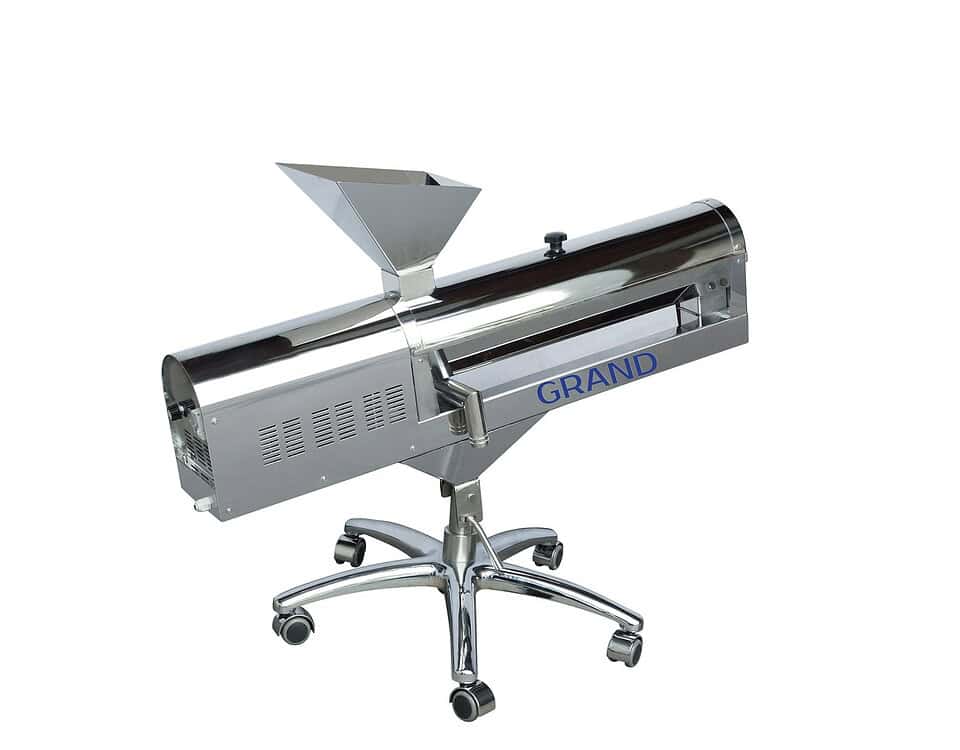
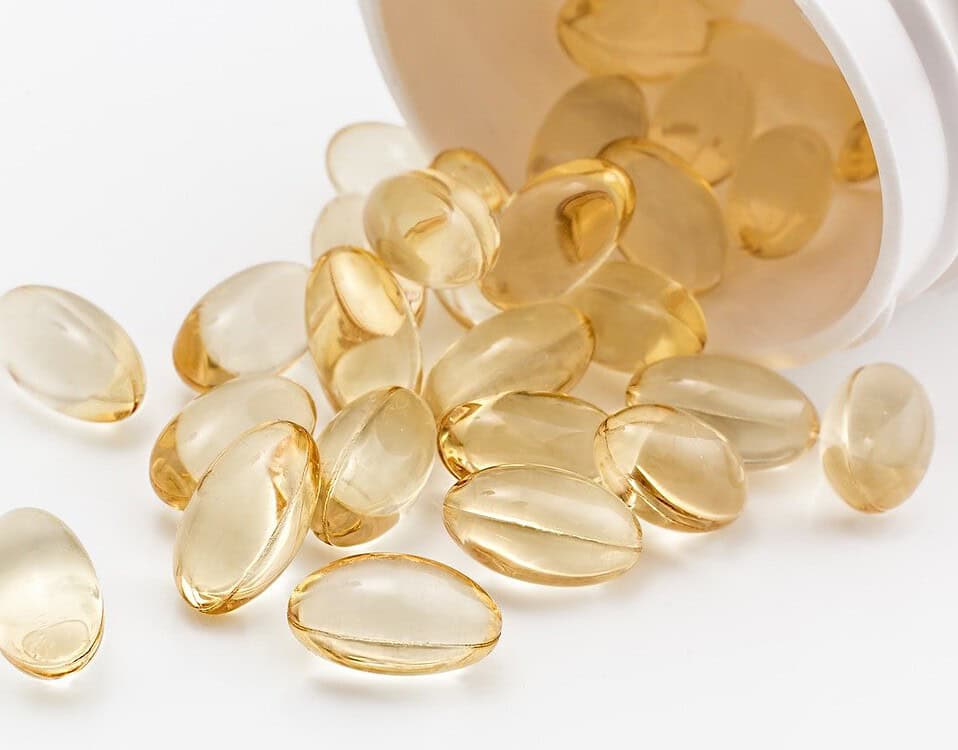
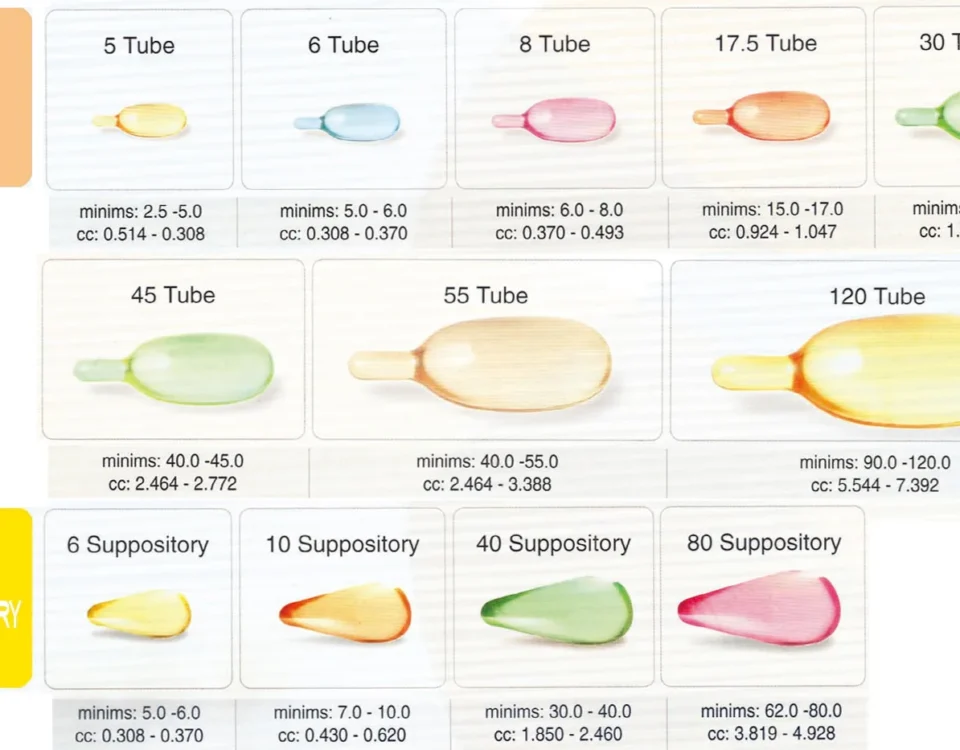

1 Comment
Mantap sekali artikelnya menambah wawasan per kapsulan terimakasih bruce wayne